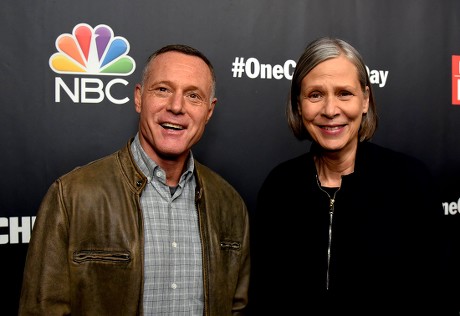
The year is 2024, and Chicago PD has been on the air for over a decade. For many fans, Sergeant Hank Voight is more than just a fictional character — he’s the embodiment of the show’s moral heartbeat, a man whose every decision forces viewers to wrestle with the meaning of justice. Sitting in a quiet corner of a Chicago café on a brisk afternoon, Jason Beghe leans back in his chair, the gravel in his voice just as unmistakable off-screen as it is on. He’s here to talk about Voight, about the thin line between right and wrong, and about why that line is often blurred beyond recognition.
“When we started, I knew Voight wasn’t going to be your typical hero,” Beghe says, his hands loosely wrapped around a steaming mug. “The thing about him is, he’s not interested in playing by the book if the book gets in the way of what’s right. But… what’s ‘right’? That’s the question we’ve been asking since day one.”
The café hums with the sound of grinding espresso machines and the occasional gust of wind pushing through the door, but Beghe speaks with the deliberate weight of someone who’s spent years living in the skin of a man constantly in the crosshairs — not just of criminals, but of morality itself.
Voight’s moral compass has always been one of Chicago PD’s most compelling — and controversial — elements. His willingness to cross lines, bend rules, and sometimes take justice into his own hands has earned him both loyal defenders and harsh critics. Beghe doesn’t shy away from that complexity. “Voight is about results,” he says. “But the cost of those results? That’s what keeps him up at night. And that’s where the drama lives.”
He pauses, glancing out the window as if searching for the right words. “Justice isn’t always black and white,” he continues. “Sometimes, it’s the shade of gray that tells you the truth.”

Over the years, Beghe has approached Voight not as a symbol, but as a man — flawed, deeply human, and forged by the tragedies he’s endured. “He’s lost people. He’s made mistakes. He’s carried guilt. All of that shapes how he sees the world. You can’t play a character like that as just ‘tough’ — you have to show the cracks in the armor.”
Those cracks often reveal themselves in the smallest moments: a lingering glance after an arrest, the way Voight’s voice softens when talking to someone he cares about, the heavy silence after a morally dubious choice. “It’s in those silences that you see who Voight really is,” Beghe says. “It’s not always in what he does, but in what it costs him to do it.”
On set, Beghe works closely with the writers to ensure Voight’s actions feel earned, even when they’re questionable. “We talk a lot about consequences,” he explains. “If Voight goes too far, what does that do to the team? To his reputation? To himself? You can’t just have him pull a stunt and walk away clean — that’s not real life.”
The dynamic within the Intelligence Unit is another key to Voight’s moral story. His loyalty to his team is absolute, sometimes to the point of recklessness. “Voight will walk through fire for his people,” Beghe says. “But the flip side is, he expects that same loyalty in return. That can be dangerous, because it blurs the line between personal loyalty and professional ethics.”
When asked about the show’s enduring connection with its audience, Beghe leans forward, his expression softening. “People see themselves in these characters, even if they’re not cops. Everyone’s faced a situation where there was no perfect choice. Everyone’s had to decide between following the rules and doing what they felt was right. That’s Voight’s life, every day.”
Filming in Chicago has only deepened Beghe’s connection to the role. “This city is a character in the show,” he says, nodding toward the window, where the late afternoon light spills across the street. “It’s beautiful, it’s tough, it’s complicated. Just like Voight. Walking these streets, talking to people here — it gives you a sense of what’s at stake. The show wouldn’t be the same if we filmed it anywhere else.”
The conversation turns to the future — for both Voight and the show. Beghe is careful not to give away spoilers, but he hints at challenges that will test the sergeant in new ways. “There are going to be moments where Voight has to look in the mirror and ask himself if the way he’s been doing things still works. The world changes. The job changes. But can he?”
